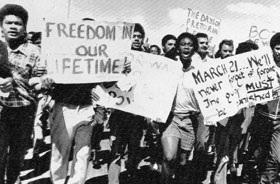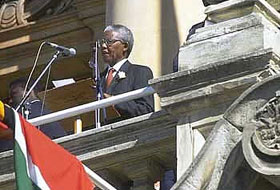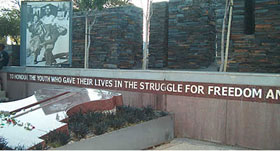Human Rights Day in South Africa
[ 2007-03-19 19:38 ]
|
1960年3月21日,南非白人种族主义政权血腥镇压南非黑人在沙佩维尔镇举行的和平游行,造成69人死亡,180人受伤。故此,3月21日被定为“南非人权日”,也可以叫做“国际消除种族歧视”。 |
|
 Sharpeville is a township outside of Johannesburg where police shot and
killed 69 anti-apartheid protesters
and wounded 180 others on March 21 1960. The protesters were resisting a new
law, The Native Laws Amendment Act,
which required all black South Africans to carry a pass that restricted their
movement in "white" urban areas. Failure to produce the reference book on demand
by the police was a punishable offence. Sharpeville is a township outside of Johannesburg where police shot and
killed 69 anti-apartheid protesters
and wounded 180 others on March 21 1960. The protesters were resisting a new
law, The Native Laws Amendment Act,
which required all black South Africans to carry a pass that restricted their
movement in "white" urban areas. Failure to produce the reference book on demand
by the police was a punishable offence.
Robert Subukwe, leader of the Pan African Congress
 |
|
President Nelson
Mandela addressing the crowd from a Town Hall balcony in
1994. | (PAC), had made the following
statement just five days before the mass killings in Sharpeville. "I have
appealed to the African people to make sure that the campaign we are to embark
on must be conducted in good spirit and non violence," he said, "and I am
certain they will heed my call. If the [government] so desires, we will provide
them with ample opportunity to demonstrate to the world how brutal they can be."
Subukwe had no idea how true his words would be. Heeding the PAC's call,
about 5,000 people marched peacefully, without their passes, gathering at the
Sharpeville police station on the morning of that fateful day in 1960. In the
ensuing scuffle, police opened fire on the protesters. The resulting carnage
shocked South Africans and the international community and the incident became
known as the Sharpeville massacre.
 |
|
Memorial in
Soweto, a township outside of Johannesburg, where students and young
people rose up against Apartheid | After the
fall of Apartheid, South Africans drew up a new Constitution under President Nelson Mandela, the
cornerstone of which is the Bill of Rights, guaranteeing freedom and equal
rights to all. The South African Human Rights Commission was launched on March
21 in 1996, 35 years after the fateful events in Sharpeville. The aim of the
Commission is to promote respect for human rights, promote the protection,
development and attainment of human rights, and to monitor and assess the
observance of human rights in the country. March 21 is now a public holiday in
South Africa called Human Rights Day.
The date is also recognized by the international community as the UN
International Day Against Racial Discrimination. Kofi Annan addressed the
injustice of the Sharpeville massacre and pointed to continuing problems with
racial intolerance stating that, "More than 40 years later, racial
discrimination, xenophobia and related intolerance are still extremely serious
problems. Indeed, discrimination is deeply embedded in the economic, social and political
structures of many societies, and has been among the root causes of a number of
violent conflicts."
As South Africans prepare to celebrate 10 years of democracy, these issues
are still relevant, and extremely high levels of gun violence have become one of
the country's most serious problems. But organizations in the IANSA network are
working hard to address these problems.
| Vocabulary:
|
| |
|
Anti-apartheid:
反种族分离的
Constitution:
宪法
Amendment:
修正
Massacre:
杀戮
Embed:
使嵌入(文中指“种族歧视深植/扎根于其社会政治、经济、生活之中”)
(通讯员东华大学傅丽莉投稿
英语点津陈蓓编辑) | |